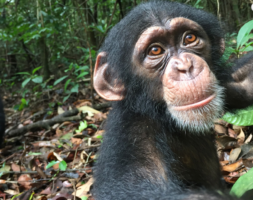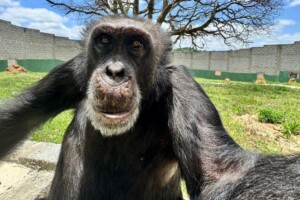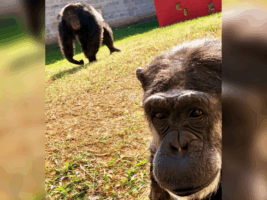Chimpanzees are mentally destroyed in zoos in the world

DEFINITIVE PROOF
In June 2011, the scientific journal PLoS ONE published a work of anthropologist Lucy P. Birket and his colleague Nicholas E. Newton-Fisher, of School of Anthropology and Conservation, University of Kent, UK, under the title “How is the Abnormal Behaviours of Captive, Zoo-Living Chimpanzees?”
This group of respected anthropologists worked with 40 chimpanzees in six zoos, three Americans and three in Great Britain. In total, there were 17 males and 23 females, and ages ranged from 8 years old to over 40. A total of 1,200 hours of observation, which gave a minimum of 1,800 minutes per individual, managed to register 37 abnormalities visible on these primates, never recorded on those of free life.
Chimpanzees came from various sources, such as other zoos, circuses, laboratories, some born in captivity and others caught in the wild. This allowed to make a mixture that eliminated the idea that the behavior arose from the origin of his past, but from the reality of current life of reclusion and public exposure in the zoos.
We present the statements related to abnormal behavior showed by the study:
ABNORMAL BEHAVIOR
Bang self against surface
Bite self
Bite hit lick self
Bounce
Clap
Clap self
Configure lips
Display to human
Drink urine
Eat faeces
Eat faeces of other
Float limb
Flumble nipple
Groom stereotypically
Groom stereotypically with object
Hit self
Incest
Jerk
Manipulate faeces
Move hand repetitively
Pace
Pat genitals
Pinch self
Pluk hair
Pluk hair of other
Poke anus
Poke eye
Regurgitate
Rock
Rub hands
Spit
Stimulate self stylezed
Toss head
Touch urine stream
Twirl
We did a quick comparison with our more than 50 chimpanzees housed at GAP Sanctuary in Sorocaba, in order to see if there was any correlation. In less than 10% of the chimpanzees in theSanctuary, 11 of these abnormal behaviors are present, which indicates that the difference in spot radically change the behavior.
The conclusion of the British anthropologists is that the situation of chimpanzees in captivity should be reassessed, and indulgently speaking, if it would be necessary or appropriate to continue keeping these individuals in captivity.
The scientific work clearly indicates that life in zoos, no matter how much there is enrichment in enclosures and resembles natural life, results in the “madness” seen in those unfortunates. If we compare with a Sanctuary, as the one in Sorocaba, where enclosures are vastly greater, they have no restriction of movement during day and night and there is no harassment of the public, it is clear that zoos – no matter what – generate an intense evil in minds of those beings and convert them into deeply disturbed individuals.
If we analyze the major disruptions – eating feces, their own or of their colleagues, drinking urine, pulling their own hair or of their colleagues and make constant repetitive movements – you will not find then in our Sanctuary. And I those existed at some point , they were of chimps that came from zoos, which over time have left all these abnormal behaviors behind.
It is absurd that Associations of Zoos, like AZA (American Zoological Association) and BIAZA (British and Irish Association of Zoos and Aquarium) insist on keeping chimpanzees in their collections of animals and exhibitions.
They collaborated on this work at the University of Kent and met their clear and evident results. At the root of it, a recommendation should be made to all its members: to try to remove to sanctuaries or areas without public visitation all groups of chimpanzees in their properties.
The other zoos in the world, including in Brazil, who insist on keeping chimpanzees in their dependencies should be aware of the crime they are committing against innocent beings, who became more mentally disturbed every day they spend submitted to public view.
We deeply hope COMMON SENSE AND COMPASSION will be the future answer to this injustice practiced against our closest species in nature and soon it will no longer exist chimpanzees in zoos on Planet Earth.

 Español
Español
 Português
Português








